Remembering dinnerladies
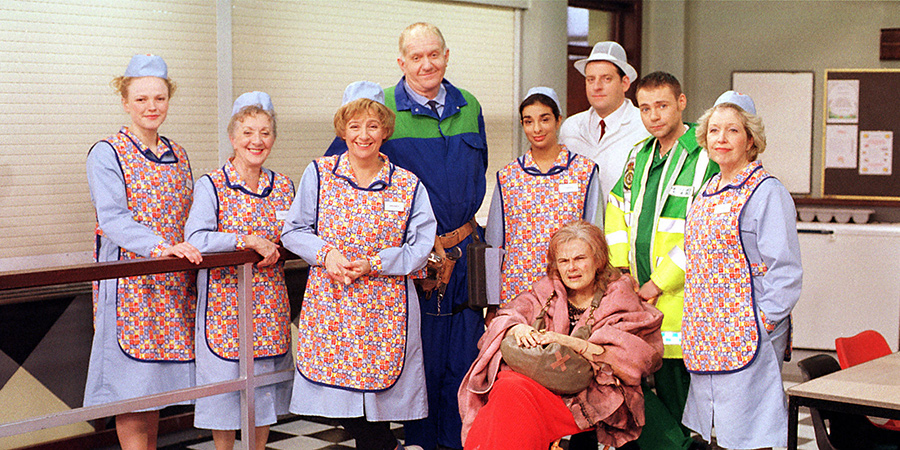
There are some television shows that simply exist, flickering across screens for a limited time, offering fleeting amusement before fading into the vast archive of broadcast history. There are then shows, that embed themselves deeper, becoming a comforting presence, a shared language, a source of genuine warmth and laughter that can be returned to again and again; for me, that show is Victoria Wood's dinnerladies.
In the landscape of late 1990s and early 2000s, dinnerladies might not have possessed the immediate, raucous edge of Men Behaving Badly or the groundbreaking fly-on-the-wall realism of The Royle Family, yet, it carved out a unique space, offering a microcosm of life lived in the fluorescent-lit, gravy-scented world of a factory canteen in industrial Manchester.
My connection to dinnerladies is deeply personal. It arrived during a specific period in my life, a time of transition and uncertainty. Its gentle rhythm and nonsense characters, its sharp, witty observations about the mundane, felt like a warm, familiar blanket. My mum worked in a canteen at the time and her stories resonated with that of Victoria Wood's make believe world.
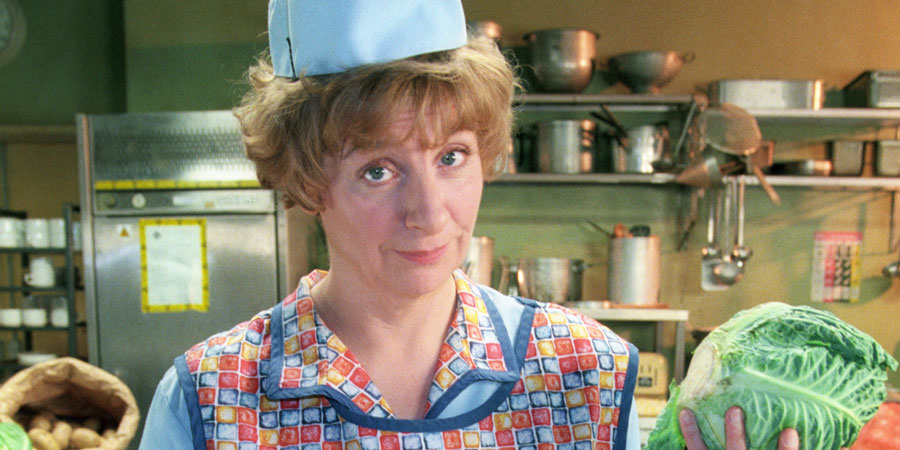
There was a comforting authenticity to the interactions; a recognition of small talk, and underlying currents of human connection, that permeate everyday working life. At the heart of dinnerladies, was of course Victoria Wood herself, playing Bren Furlong.
Now (and I say this with the utmost respect and affection for the gargantuan talent that she was), she wasn't (in my humble opinion), the greatest actor in the traditional sense. She wasn't a chameleon who disappeared into roles and you were always aware you were watching Victoria Wood, but I firmly believe she knew this. It was part of her charm, her appeal, she was inherently watchable, because she was her.
Where Victoria Wood truly excelled and where she was a towering figure in British comedy, was as a writer, and this is where dinnerladies shines brightest. It was a testament to her incredible skill that she assembled a cast of phenomenal actors, and gifted them with the best lines her typewriter had presented.
Think about it; whilst Bren had her moments of quiet wit and understated reactions, the laugh-out-loud, quotable gems were so often delivered by the likes of Julie Walters as the monstrous (but hilarious) Petula. Thelma Barlow as the prudish and easily scandalised Dolly, Anne Reid as the perpetually downtrodden Jean, and Celia Imrie as the effortlessly sarcastic Philippa; Victoria Wood, the writer, understood the strengths of her ensemble and played to them magnificently.
She was happy to let others take the comedic spotlight and this wasn't an ego-driven star vehicle, it was a truly ensemble piece, and that collaborative spirit, orchestrated by Wood's writing.
It's a fascinating contrast to some of the other sitcoms of the era, where the central star was often the sole, or primary, source of humour. In Absolutely Fabulous, whilst the supporting cast was brilliant, the comedic engine was unequivocally Jennifer Saunders and Joanna Lumley; in Men Behaving Badly, Martin Clunes and Neil Morrissey were the undeniable focus; even in The Vicar Of Dibley, Dawn French was the clear gravitational centre; dinnerladies, however, felt different.
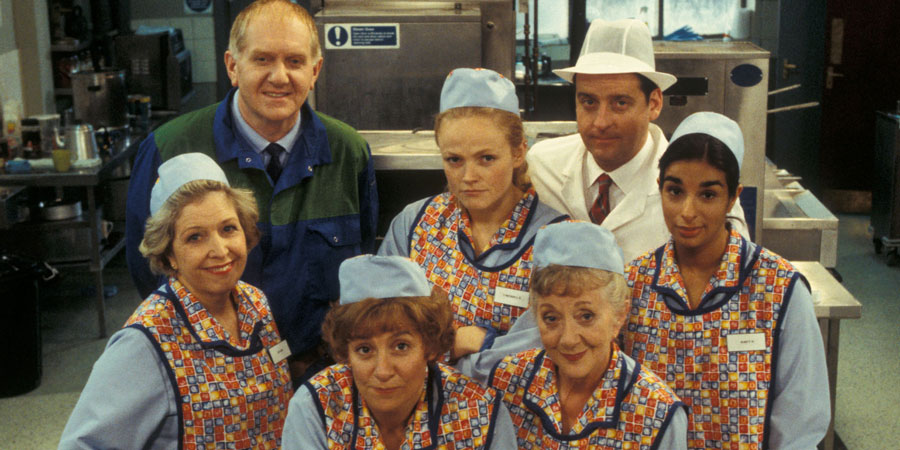
The humour was more distributed and more democratic. Each character, no matter how seemingly minor, had their moments to land a punchline or deliver a line that would stay with you.
This generosity extended beyond just individual lines. Victoria Wood had an almost unparalleled ability to orchestrate scenes where multiple conversations were happening simultaneously, each revealing character and advancing different (often unrelated) plot points, yet somehow coalescing into a harmonious, often hilarious scene; it was a masterclass in dialogue writing and comedic timing.
Consider a typical scene in the canteen; Bren asks if anyone has seen a film on 'telly' with Dirk Bogarde which then links to Dolly and Jean discussing a film about frozen sperm in a freezer with the classic line "she should have cleared her freezer out more often". Meanwhile, Stan the caretaker might wander through with a seemingly non-sequitur comment about plumbing or the weather.
It wasn't just noise, it was carefully constructed chaos that mirrored the reality of a busy workplace. People talk over each other, conversations fragment and intertwine, and important moments can be buried within the everyday hum and Victoria captured this beautifully. It required incredibly precise writing and brilliant performances from the cast to make it work, and they pulled it off flawlessly.
This multi-layered approach to dialogue was a refreshing change from the more traditional sitcom format where scenes often focused on a single conversation or comedic set-up. It gave dinnerladies a sense of depth and realism that belied its studio audience and traditional sitcom structure.
The Royle Family achieved its realism through naturalistic dialogue and single-camera filming, dinnerladies found a different path, using rapid-fire, overlapping dialogue within a more conventional format to create a similar sense of 'lived' experience.
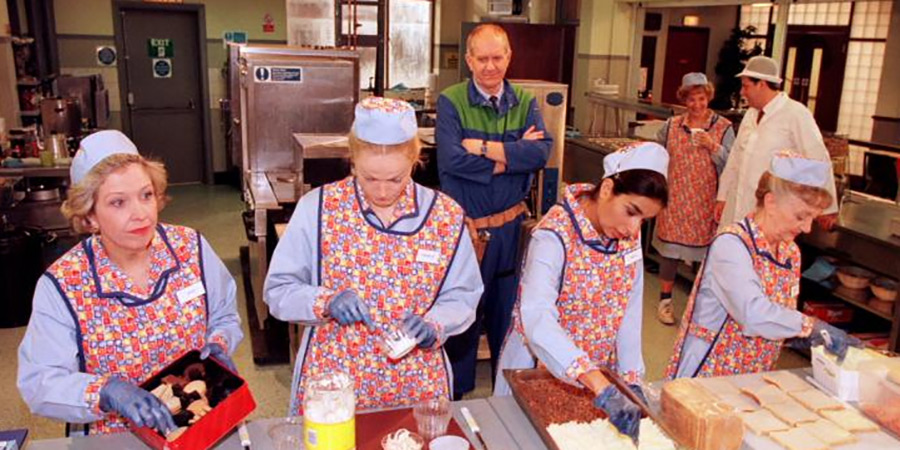
Whilst shows like Friends (hugely popular in the UK at the time) relied on snappy one-liners and often isolated comedic scenarios, dinnerladies built its humour from the ground up, out of the shared history and intertwined lives of its characters. The jokes often landed, not just because they were well-written, but because they came from a place of deep understanding of who these people were.
Take Dolly and Jean, for example; their entire dynamic was built on years of shared history, petty grievances, and underlying affection. Their conversations, often circling back on an old argument or recurring annoyances, these were constant sources of comedy, but also felt incredibly real. Their bickering was never truly malicious; it was the comfortable sparring of old friends. This level of character development and relational depth wasn't always present in sitcoms that prioritised quick gags over sustained character arcs.
Similarly, the slow-burning romance between Bren and Tony was handled with a tenderness and awkwardness that felt far more nuanced than many sitcom relationships of the time.
Their conversations were often filled with unspoken feelings and hesitant gestures and they were all conveyed through subtle dialogue and performance. It was a storyline that unfolded gradually, rewarding viewers who were invested in the characters' journeys, and tied up nicely in the last episode by a carefully constructed story arc by Wood.
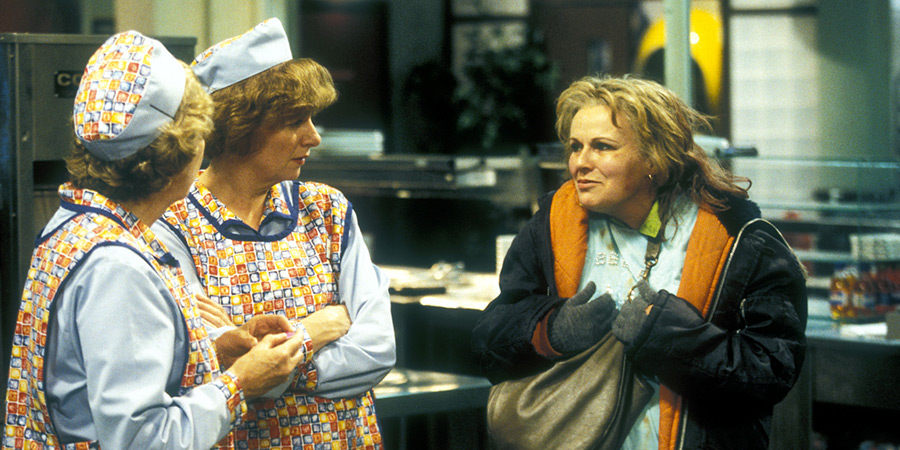
Even the more comedic characters, like Petula, had layers. Whilst she was undoubtedly a caricature of a certain type of difficult mother, Julie Walters imbued her with enough humanity (albeit often buried deep) to prevent her from becoming a one-dimensional 'villain'. Her interactions with Bren, were often painful to watch, but also contained moments of dark humour that only a writer of Wood's calibre could craft.
The setting of the canteen itself was also crucial to the show's success and contributed to its unique feel. Unlike the aspirational settings of shows like Absolutely Fabulous or the domestic confines of The Royle Family, the canteen was a transient space, a workplace that brought together a disparate group of people who might not otherwise socialise. This provided a natural stage for encounters, conflicts, and moments of unexpected camaraderie.
The mundane reality of the canteen, the chipped mugs, the questionable food, the endless washing up, all served as a grounding force for the more heightened comedic elements. It was a reminder that even in the most ordinary of settings, extraordinary human dramas can unfold.
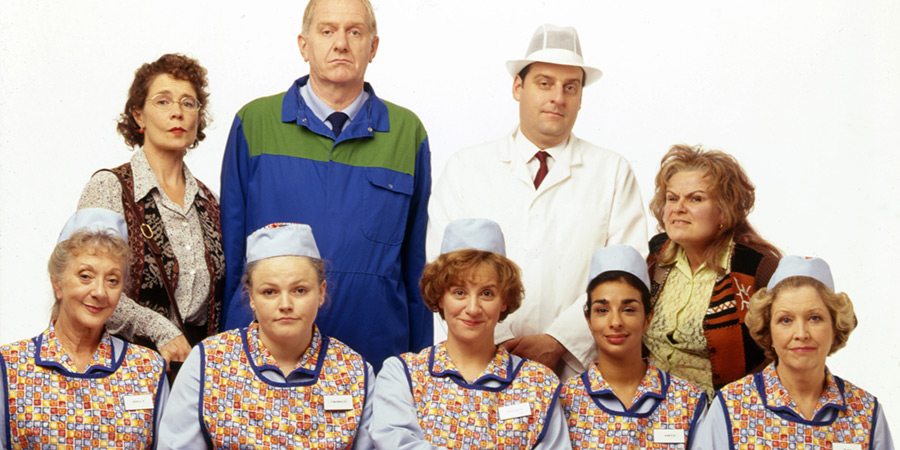
In conclusion; dinnerladies holds a special place in my heart not just as a funny sitcom, but as a beautifully observed and generously written portrayal of everyday life. Victoria Wood, with her self-aware approach to acting and her unparalleled talent as a writer, created a world filled with flawed, lovable characters whose conversations, often overlapping and seemingly chaotic, revealed profound truths about human connection, resilience, and the enduring power of a good cuppa and a sympathetic ear.
It might not have been the loudest or the flashiest sitcom of its era, but for me, its warmth, its wit, and its genuine affection for its characters make it a true classic. It's a show I return to whenever I need a reminder that even in the most ordinary of places, there's always more than just gravy; it was, and remains, a small masterpiece of its time.
Help British comedy by becoming a BCG Supporter. Donate and join us in preserving, amplifying and investing in comedy of all forms, from the grass roots up. Advertising doesn't cover our costs, so every single donation matters and is put to good use. Thank you.
Love comedy? Find out more

